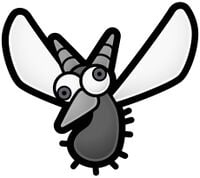Jabbi: Difference between revisions
From the Super Mario Wiki, the Mario encyclopedia
Jump to navigationJump to search
(I know this because I actually did have trouble figuring out how t opronounce their name. ~~~~ Zaphod Scotsman) |
(→Trivia) |
||
| Line 7: | Line 7: | ||
==Trivia== | ==Trivia== | ||
*Inside the Great Tree, in a room there is a Jabbi hidden in a bush. If the [[player]] were to shake the bush the Jabbi would come out, give [[Mario]] a [[Mushroom]] and then run away. | *Inside the Great Tree, in a room there is a Jabbi hidden in a bush. If the [[player]] were to shake the bush the Jabbi would come out, give [[Mario]] a [[Mushroom]] and then run away. | ||
*Pronouncing the name can be difficult and confusing because [http://en.wikipedia.org/wiki/ | *Pronouncing the name can be difficult and confusing because [http://en.wikipedia.org/wiki/PeccaryJavelina] comes from Spanish so the "j" sounds like an "h." | ||
<br clear=all> | <br clear=all> | ||
[[Category:Species]] | [[Category:Species]] | ||
Revision as of 23:57, April 21, 2011
Jabbies are gray, mosquito-like insects that live in the Great Tree alongside the Punies. The Jabbies ally themselves with the X-Nauts in order to gain control of the tree. In the second chapter of Paper Mario: The Thousand-Year Door, Mario and his friends must save the Punies from the Jabbies. Mario and the Puni army following him wage a short war on two of the Jabbi hives. After the chapter, the Jabbies learn to live in peace with the Punies. The only Jabbi whose name is known is Jabble, whom Punio says used to be his friend and wonders if he was involved in the alliance with the X-Nauts. It is proven he did not if the player uses Madame Flurrie to find the secret store, where he is found in.
Notable Jabbies
Trivia
- Inside the Great Tree, in a room there is a Jabbi hidden in a bush. If the player were to shake the bush the Jabbi would come out, give Mario a Mushroom and then run away.
- Pronouncing the name can be difficult and confusing because [1] comes from Spanish so the "j" sounds like an "h."
